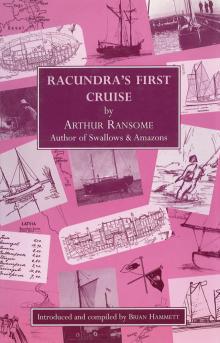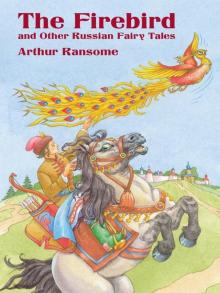- Home
- Arthur Ransome
Missee Lee Page 11
Missee Lee Read online
Page 11
“Not tly to lun away,” remarked the Taicoon.
“Of course not,” said Titty. “They’ve seen us.” And then the dreadful thought struck her that perhaps she had made a mistake in pointing them out. But no. Nothing was worse than not being all together.
John and Susan, with the two guards, were climbing wearily up towards the road. Their faces were covered with dust except where they were streaked with sweat.
“Oh Roger, Roger,” panted Susan. “And Titty . …” John went straight up to the Taicoon. “Please,” he said. “We want help at once. A man and two girls have been captured by pirates. …”
The Taicoon stared at him, not understanding.
“But he’s got them himself,” said Titty. “We’re going to see them now.”
“But we’ve seen them,” said John. “They were carrying Captain Flint along in a cage like a hen-coop, and Nancy and Peggy had their hands tied behind their backs. And our boats have gone. …”
“You been Missee Lee’s island,” said the Taicoon.
“That was her dictionary,” said Roger. “And her Primus.”
“Plisoners,” said the Taicoon briefly. “You see Missee Lee tomollow.” And then, suddenly, a new idea struck him. “More buds?” he asked, looking to see if John and Susan were carrying parrot-cages on their backs. “No buds,” he said sadly, and then, “Melican?”
“English,” said John.
“San Flancisco, Melican,” said the Taicoon, frowning, gave an order and set the procession once more on its way.
“Susan,” said Roger, “would you like to ride my donkey?”
“No,” said Susan. “We’ve walked miles and miles looking for you and we may as well go on now. Why didn’t you stay where we left you?”
“Never mind that now,” said John. “If they had they’d only have been bagged by the people who took the boats.”
CHANG AND HIS PRISONERS
There was not much talking among the prisoners. Titty and Roger, on the jolting donkeys, dared not open their mouths and John and Susan were too tired and bothered to answer questions that had not been asked. But, when the road stopped climbing and over the top of the hill began to dip and they caught a glimpse of forest, and water below them, and walking was not such hard work, Titty and Roger learnt something of what had happened to the others. They heard how John and Susan had come almost to the fort at the riverside only to see Captain Flint and the others going up into the hills as prisoners. They heard how they had seen a fleet of small boats coming down the river, how there had been a lot of strange whistling, how they had seen boats round the little island they had left and how on coming back they had found Swallow and Amazon gone and how they had spent hour after hour searching, half thinking Titty and Roger had been taken with the boats, half hoping to find them because of their tracks in the belt of forest. They heard how in the end John had decided that the only thing to do was to follow Captain Flint and give themselves up, and then, how they had hoped, when they saw Titty and Roger on donkeys, that they had fallen among friends.
“Tiger Town,” said the one-time cook walking at the head of Titty’s donkey. The road was dropping from the rocky bare hillside towards green rice fields and bamboo woods. They could see a brown wall and green roofs.
“Not much like a town,” said Roger.
The procession broke into a trot, the men running, John and Susan wearily running with them, Titty and Roger painfully jolting on their wooden saddles. Another road joined the one they were on, which now ran straight between the rice fields to a high brown gateway in the wall. As the man with the tiger banner passed under the gateway, the procession slowed to a walk, and a great gong or bell boomed overhead. Boom. … Boom. … Boom. … Four, five, six, seven, eight, nine, ten. … Men with rifles presented arms.
“That must be a salute,” thought Titty. “Head of everything?” she asked, pointing to the Taicoon, swaying before her in his chair. The one-time cook did not understand her. “King?” said Titty. “General?”
The one-time cook looked almost frightened. He shook his head. “Chang, velly gleat man,” he said. “Chang, ten gong Taicoon. But. …” He lowered his voice … “Missee Lee number one. Missee Lee, twenty-two gong Taicoon.”
“Is she here?” asked Titty.
The one-time cook shook his head.
“Look at that,” cried Roger. “And I thought we’d never see a bigger one.”
Titty looked round, saw where Roger was pointing, and in her surprise, almost forgot the pains of donkey-riding. The huge head of a dragon was lying, as it were, on one cheek, just inside the gateway. Two men were working on it with a paint-pot, brightening up the red paint. Another was sticking silver scales on its neck. A row of women were busy stitching at something like a carpet that was stretched along under the wall.
The one-time cook laughed. “Makee dlagon ship-shape,” he said, “Leady for Dlagon Feast.”
“It’s for a carnival,” said John. “I’ve seen pictures.”
But, if the dragon interested the prisoners, they themselves were much more interesting to everybody else. Only one man stuck to his work with the paint-pot. The other and the women, who had been sitting at their work, got up and followed them. Children playing in the dust raced after them, pushed close to the donkeys and tried to touch the prisoners.
“It’s like being a circus,” said Roger.
They went on through the green-roofed village to another gateway.
“Taicoon Chang’s yamen,” said the one-time cook.
Again a gong sounded ten times. Men with rifles ran out to meet them. They passed through into a dusty courtyard with one-storey houses all round it. At the far corner of the yard a small crowd was standing before one of the houses. A man in a black skull-cap, with a revolver slung from a belt about his middle, left the crowd and came to speak to the Taicoon, who was getting out of his chair which had been set down before a large house on the opposite side of the courtyard. The Taicoon, listened and pointed to his prisoners. The grasshopper hunters were carrying the bird-cages into the house. The Taicoon, with his canary, turned to follow them. He stopped a moment and spoke to Titty.
“He show you San Flancisco,” he said, nodding towards the crowd. “Then we go hear my buds. No belong sing when sun go down.” He turned away and went up the steps into the house.
The man with the revolver beckoned and walked across the courtyard. John, Susan, Titty and Roger followed him. He shouted an order and the crowd made room, though hands shot out from all sides to feel the prisoners’ clothes. They were looking at a grille or iron bars, like the front of a cage at the zoo. For a moment they could see nothing behind the bars, but then, looking into the darkness at the back, they saw Captain Flint, sitting on the ground, asleep, with his back against the wall.
“Hey! Captain Flint!” cried Titty.
Captain Flint opened his eyes, leapt to his feet and in a moment was at the bars.
“Gosh!” he said. “You got ashore all right. John, Susan, Titty, Roger. All the lot of you. Bless my soul and I haven’t had a minute without wondering what I was to say to your mother. That fine lad, standing behind you, picked us up and wouldn’t stop to look for you. And it blew that night. Were you picked up by another of’em? We’re in a fix yet, but who cares what happens now?”
“Where are Nancy and Peggy?” asked John.
“In the lock-up,” said Captain Flint.
“Hi! Captain!” Nancy’s voice came from somewhere close by. And then, “Barbecued billygoats! Jibbooms and bobstays. Ten thousand million cheers! Shiver my timbers! KEEP STILL, PEGGY! It’s the Swallows. Here.”
The Chinese with the revolver was smiling upwards. They looked up and saw Nancy’s face behind the bars of a small square window above their heads.
“Where’s Peggy?” said Roger.
“You can’t see her just for a minute,” said Nancy. “I’m standing on her shoulders. Don’t jiggle about,” she added, looking down. “It’s the Swall
ows, the whole lot of them. … Ow!”
Nancy vanished.
“Peggy, you tame galoot, I nearly broke my leg.”
“Well, let me see.” They heard Peggy’s voice.
A moment later they saw her face at the window, but not for long. By the way that Peggy’s face was bobbing up and down they could tell that Nancy was not keeping very still.
“Didn’t I tell you she’d say ‘Barbecued billy-goats’?” said Roger.
“Ask them how they got here.” They heard Nancy’s voice.
“We landed on an island,” said Roger.
“We did lots better.” They heard Nancy’s voice again. “We got picked up by pirates. We were in a pirate fight. Oh, look here, Peggy, I can’t tell them unless I can see their mugs. …”
Peggy disappeared, and a moment later Nancy was at the window again, explaining. “Guns. … A battle. … Captain Flint had a row with them because they wouldn’t stop to look for you. They knocked him out. That’s our captain … the captain of the junk. They left us in the junk all night and we got away in Amazon … we didn’t mean to but … well, somebody forgot to make a clove hitch. … We just drifted away. …”
“We saw you,” said Roger.
“And then we got caught again and they brought us here. They carried Captain Flint in a cage.”
“But he’s still in a cage,” said Titty.
“That one was worse,” said Captain Flint from behind his bars.
“What are we going to do?” said Susan.
“Look here,” said Captain Flint, talking fast, and almost in a whisper. “If they ask you questions, the pirates, don’t tell them too much.” His face was close to the bars. “You keep mum.”
“They said you were Lord Mayor of San Francisco,” said Roger.
“And so I am,” said Captain Flint, and whispered again. “It’s a good long way off. Take some time for them to send a message there to ask for a ransom. We don’t want them trying Hong Kong and having some fool of a consul cabling home and stirring up your mothers.”
“But we’ll get home,” said Susan.
“Of course we will,” said Captain Flint. “We’ll be all right now we’re all together.”
Roger suddenly shook a bar of Captain Flint’s cage. “Why don’t you let him out?” he said angrily to the junk captain with the revolver.
The junk captain looked grave. “Him mad,” he said. “Him velly too much stlong. Him velly near kill my sailor.”
“Gosh!” said Roger, and looked with a new respect at Captain Flint.
“Look at the little beasts,” said Nancy from her window. “Shiver my timbers but I’d like to get a hand on them.”
Three small Chinese boys were standing just far enough from the bars to make it impossible for Captain Flint to reach them. All three were doing the same thing, grinning from ear to ear and hitting the backs of their necks with the edge of a hand. At that moment they thought of something better. One did a good imitation of chopping off his fingers. Another bent his head while the third swung his arm up and brought down his hand, edgeways, as if to cut off the other’s head.
“Little beasts,” growled Nancy. “They’ve been doing that sort of thing ever since we got here.”
“Just cheering us up,” said Captain Flint. He roared like a tiger and the three small boys started back and then, keeping safely out of reach, went through their performance again.
“Look here, Skipper,” said Captain Flint, looking at the man with the revolver, the one whom Nancy had called “our” captain. “When are you going to let us out?”
The man smiled gravely and put a hand to his ear.
“Look here, Captain, dash it all, Admiral if you like, when are you going to let us out?”
“Talkee English, bimeby,” said the captain.
“That’s all we can get out of him,” said Nancy.
“And I couldn’t get much more out of the big boss with the bird,” said Captain Flint. “Wish I’d picked up more Chinese when I was fooling about in Java years ago. There’s something funny about this lot. The big boss wasn’t more than half pleased with the captain for bringing us along last night. He was thinking of getting rid of us out of hand until I told him who I was.”
“Lord Mayor,” murmured Titty.
“It was San Francisco that did it,” said Captain Flint.
“He isn’t the big boss,” said Titty. “Not really. It’s Missee Lee.”
“I’d guessed as much,” said Captain Flint.
“We’re going to see her tomorrow,” said Roger.
“Good,” said Captain Flint. “Cheer up, John, old chap. And you, Susan. If only we can find somebody who really does talk English we ought to be all right.”
There was a stir among the crowd and looking round they saw that the Taicoon, Chang, head and shoulders taller than his guards, had come out of his house and was crossing the courtyard towards them. He came straight up to Titty and tapped her on the shoulder. “Come walkee quick time,” he said. “Hear plenty fine buds.”
“Can’t you let us out?” said Nancy.
The Taicoon looked up at the little barred window.
“Couldn’t we all be together?” said Titty.
“They lun away,” said the Taicoon.
“We didn’t mean to,” said Nancy.
“They won’t run away now,” said Titty. “We none of us will. Can’t you see Susan’s tired out?”
The Taicoon may have understood something of what she was saying. Or it may have been that he was in a hurry to show Titty his birds. He signed to the captain, who unfastened the door under Nancy’s window. In a moment all six of the Swallows and Amazons were shaking hands together.
“But Captain Flint?” said Roger.
“Too much stlong,” said the Taicoon. “Him belong plison. Tomollow see Missee Lee.” He smiled at Titty. “Now you come see fine buds.”
Together, the Taicoon, his blue skull-cap with its scarlet button high above the crowd, and Titty, looking doubtfully back over her shoulder, went off across the courtyard. Another door had been opened and John, Susan, Nancy, Peggy and Roger were being shepherded towards it. The one-time cook was going with them carrying the ship’s parrot. There seemed to be an argument about Gibber. Behind his bars she saw Captain Flint wave a cheerful hand.
“What’s going to happen to them?” she said.
“All sleep one house,” said the Taicoon. “Tomollow all plisoners see Missee Lee. All eat man fan with Taicoon. … Supper. Perlaps tomollow no supper. No heads. No wantee chow.”
Not very cheering, thought Titty, but the Taicoon did not seem to think it mattered.
“Fine buds in Melica?” he asked.
“Lots and lots,” said Titty.
CHAPTER IX
PIRATE SUPPER
THE Taicoon led the way up the steps into his house. Titty looked round at walls hung with a strange mixture of guns, swords and pictures of birds painted on silk. Chang clapped his hands. A man came running in, listened to what Chang had to say, and ran out again. They went on through a larger room with a long table in it and out on a wide verandah into a babel of bird-song. The evening sun, slanting low over a garden, was lighting up row upon row of bamboo cages, and the birds were singing each against all.
The Taicoon, smiling happily, passed from cage to cage, inviting Titty to listen. He seemed able, in all that din of song, to pick out the voice of any bird he chose, and to shut his ears to all the rest. Titty could hear them only as an orchestra all making a noise at the same time. The Taicoon would stop by a cage, point to a bird and cup a hand over one ear. His blue skull-cap with its scarlet button would nod slowly, and he would look round at Titty, asking for applause. Then he would move to another cage and do the same. “Bud like him in Melica? Bud like him in San Flancisco?” And Titty wished to goodness Captain Flint had chosen to make himself Lord Mayor of a place she knew a little more about.
There seemed to be hundreds of birds, larks and thrushes mostly but
many that she did not know at all. And the Taicoon kept stopping now by one and now by another. “Lovely, lovely,” Titty kept saying and wished she could think of something else. She clapped her hands together when she saw the Taicoon wanted her to be particularly pleased. That was easier. What was the good of saying anything when you could hardly hear yourself speak?
The queer thing was that, happy though the Taicoon seemed in showing off his birds, she knew he had something on his mind. They were only half-way along the rows of cages when, after listening to a bird, he stood for a moment, looking far away towards the setting sun. He looked down at Titty.
“Captain James Flint,” he said slowly. “San Flancisco. … Melican. Why for you not Melican too?”
“I’m English,” said Titty.
“Better you Melican,” he said, and then, “Missee Lee see plisoners tomollow. Missee Lee chop heads. …”
“Not if she knows English,” said Titty cheerfully.
A new idea struck the Taicoon.
“Melican bud,” he said. “Pallot.” He seemed to be trying to offer some sort of comfort. “If Missee Lee chop heads. … Melican bud come live here. Taicoon Chang take care of him.” And then, not waiting for an answer, he shrugged his shoulders as if casting off whatever was in his mind, and turned again to his bird-cages.
The sun went down behind the hills in the west and the chorus of the birds died away. “No sun, no sing,” said the Taicoon. In the quickly deepening shadow he went back along the verandah and stopped by some cages of white canaries like the one he had had with him all day. He opened the doors of the cages and brought out one bird after another for Titty to admire. Titty wished she had not said “Lovely” so often already. But she liked the canaries and, even if no other word but “Lovely” would come into her mouth, at least she was able to say it as if she meant it. When the Taicoon shut up the last canary and turned to lead the way back into the house he was talking happily as hard as he could and Titty mostly not understanding what he said was getting along quite well by saying “Yes” every now and then.

 Peter Duck: A Treasure Hunt in the Caribbees
Peter Duck: A Treasure Hunt in the Caribbees Racundra's First Cruise
Racundra's First Cruise Great Northern?
Great Northern? Swallowdale
Swallowdale Swallows and Amazons
Swallows and Amazons Winter Holiday
Winter Holiday Missee Lee: The Swallows and Amazons in the China Seas
Missee Lee: The Swallows and Amazons in the China Seas Pigeon Post
Pigeon Post We Didn't Mean to Go to Sea
We Didn't Mean to Go to Sea The Firebird and Other Russian Fairy Tales
The Firebird and Other Russian Fairy Tales Coot Club
Coot Club The Big Six: A Novel
The Big Six: A Novel Six Weeks in Russia, 1919
Six Weeks in Russia, 1919 Secret Water
Secret Water The Big Six
The Big Six Missee Lee
Missee Lee Peter Duck
Peter Duck The Picts and the Martyrs
The Picts and the Martyrs